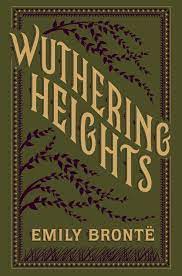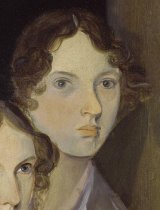Wuthering Heights Page #16
Wuthering Heights is an 1847 novel by Emily Brontë, initially published under the pseudonym Ellis Bell. It concerns two families of the landed gentry living on the West Yorkshire moors, the Earnshaws and the Lintons, and their turbulent relationships with Earnshaw's adopted son, Heathcliff.
So I chattered on; and Heathcliff gradually lost his frown and began to look quite pleasant, when all at once our conversation was interrupted by a rumbling sound moving up the road and entering the court. He ran to the window and I to the door, just in time to behold the two Lintons descend from the family carriage, smothered in cloaks and furs, and the Earnshaws dismount from their horses: they often rode to church in winter. Catherine took a hand of each of the children, and brought them into the house and set them before the fire, which quickly put colour into their white faces. I urged my companion to hasten now and show his amiable humour, and he willingly obeyed; but ill luck would have it that, as he opened the door leading from the kitchen on one side, Hindley opened it on the other. They met, and the master, irritated at seeing him clean and cheerful, or, perhaps, eager to keep his promise to Mrs. Linton, shoved him back with a sudden thrust, and angrily bade Joseph “keep the fellow out of the room—send him into the garret till dinner is over. He’ll be cramming his fingers in the tarts and stealing the fruit, if left alone with them a minute.” “Nay, sir,” I could not avoid answering, “he’ll touch nothing, not he: and I suppose he must have his share of the dainties as well as we.” “He shall have his share of my hand, if I catch him downstairs till dark,” cried Hindley. “Begone, you vagabond! What! you are attempting the coxcomb, are you? Wait till I get hold of those elegant locks—see if I won’t pull them a bit longer!” “They are long enough already,” observed Master Linton, peeping from the doorway; “I wonder they don’t make his head ache. It’s like a colt’s mane over his eyes!” He ventured this remark without any intention to insult; but Heathcliff’s violent nature was not prepared to endure the appearance of impertinence from one whom he seemed to hate, even then, as a rival. He seized a tureen of hot apple sauce (the first thing that came under his grip) and dashed it full against the speaker’s face and neck; who instantly commenced a lament that brought Isabella and Catherine hurrying to the place. Mr. Earnshaw snatched up the culprit directly and conveyed him to his chamber; where, doubtless, he administered a rough remedy to cool the fit of passion, for he appeared red and breathless. I got the dishcloth, and rather spitefully scrubbed Edgar’s nose and mouth, affirming it served him right for meddling. His sister began weeping to go home, and Cathy stood by confounded, blushing for all. “You should not have spoken to him!” she expostulated with Master Linton. “He was in a bad temper, and now you’ve spoilt your visit; and he’ll be flogged: I hate him to be flogged! I can’t eat my dinner. Why did you speak to him, Edgar?” “I didn’t,” sobbed the youth, escaping from my hands, and finishing the remainder of the purification with his cambric pocket-handkerchief. “I promised mamma that I wouldn’t say one word to him, and I didn’t.” “Well, don’t cry,” replied Catherine, contemptuously; “you’re not killed. Don’t make more mischief; my brother is coming: be quiet! Hush, Isabella! Has anybody hurt you?” “There, there, children—to your seats!” cried Hindley, bustling in. “That brute of a lad has warmed me nicely. Next time, Master Edgar, take the law into your own fists—it will give you an appetite!” The little party recovered its equanimity at sight of the fragrant feast. They were hungry after their ride, and easily consoled, since no real harm had befallen them. Mr. Earnshaw carved bountiful platefuls, and the mistress made them merry with lively talk. I waited behind her chair, and was pained to behold Catherine, with dry eyes and an indifferent air, commence cutting up the wing of a goose before her. “An unfeeling child,” I thought to myself; “how lightly she dismisses her old playmate’s troubles. I could not have imagined her to be so selfish.” She lifted a mouthful to her lips: then she set it down again: her cheeks flushed, and the tears gushed over them. She slipped her fork to the floor, and hastily dived under the cloth to conceal her emotion. I did not call her unfeeling long; for I perceived she was in purgatory throughout the day, and wearying to find an opportunity of getting by herself, or paying a visit to Heathcliff, who had been locked up by the master: as I discovered, on endeavouring to introduce to him a private mess of victuals. In the evening we had a dance. Cathy begged that he might be liberated then, as Isabella Linton had no partner: her entreaties were vain, and I was appointed to supply the deficiency. We got rid of all gloom in the excitement of the exercise, and our pleasure was increased by the arrival of the Gimmerton band, mustering fifteen strong: a trumpet, a trombone, clarionets, bassoons, French horns, and a bass viol, besides singers. They go the rounds of all the respectable houses, and receive contributions every Christmas, and we esteemed it a first-rate treat to hear them. After the usual carols had been sung, we set them to songs and glees. Mrs. Earnshaw loved the music, and so they gave us plenty. Catherine loved it too: but she said it sounded sweetest at the top of the steps, and she went up in the dark: I followed. They shut the house door below, never noting our absence, it was so full of people. She made no stay at the stairs’-head, but mounted farther, to the garret where Heathcliff was confined, and called him. He stubbornly declined answering for a while: she persevered, and finally persuaded him to hold communion with her through the boards. I let the poor things converse unmolested, till I supposed the songs were going to cease, and the singers to get some refreshment: then I clambered up the ladder to warn her. Instead of finding her outside, I heard her voice within. The little monkey had crept by the skylight of one garret, along the roof, into the skylight of the other, and it was with the utmost difficulty I could coax her out again. When she did come, Heathcliff came with her, and she insisted that I should take him into the kitchen, as my fellow-servant had gone to a neighbour’s, to be removed from the sound of our “devil’s psalmody,” as it pleased him to call it. I told them I intended by no means to encourage their tricks: but as the prisoner had never broken his fast since yesterday’s dinner, I would wink at his cheating Mr. Hindley that once. He went down: I set him a stool by the fire, and offered him a quantity of good things: but he was sick and could eat little, and my attempts to entertain him were thrown away. He leant his two elbows on his knees, and his chin on his hands and remained rapt in dumb meditation. On my inquiring the subject of his thoughts, he answered gravely—“I’m trying to settle how I shall pay Hindley back. I don’t care how long I wait, if I can only do it at last. I hope he will not die before I do!”
Translation
Translate and read this book in other languages:
Select another language:
- - Select -
- 简体中文 (Chinese - Simplified)
- 繁體中文 (Chinese - Traditional)
- Español (Spanish)
- Esperanto (Esperanto)
- 日本語 (Japanese)
- Português (Portuguese)
- Deutsch (German)
- العربية (Arabic)
- Français (French)
- Русский (Russian)
- ಕನ್ನಡ (Kannada)
- 한국어 (Korean)
- עברית (Hebrew)
- Gaeilge (Irish)
- Українська (Ukrainian)
- اردو (Urdu)
- Magyar (Hungarian)
- मानक हिन्दी (Hindi)
- Indonesia (Indonesian)
- Italiano (Italian)
- தமிழ் (Tamil)
- Türkçe (Turkish)
- తెలుగు (Telugu)
- ภาษาไทย (Thai)
- Tiếng Việt (Vietnamese)
- Čeština (Czech)
- Polski (Polish)
- Bahasa Indonesia (Indonesian)
- Românește (Romanian)
- Nederlands (Dutch)
- Ελληνικά (Greek)
- Latinum (Latin)
- Svenska (Swedish)
- Dansk (Danish)
- Suomi (Finnish)
- فارسی (Persian)
- ייִדיש (Yiddish)
- հայերեն (Armenian)
- Norsk (Norwegian)
- English (English)
Citation
Use the citation below to add this book to your bibliography:
Style:MLAChicagoAPA
"Wuthering Heights Books." Literature.com. STANDS4 LLC, 2025. Web. 16 Jan. 2025. <https://www.literature.com/book/wuthering_heights_1627>.




Discuss this Wuthering Heights book with the community:
Report Comment
We're doing our best to make sure our content is useful, accurate and safe.
If by any chance you spot an inappropriate comment while navigating through our website please use this form to let us know, and we'll take care of it shortly.
Attachment
You need to be logged in to favorite.
Log In